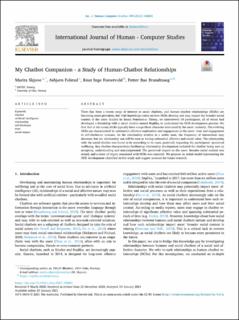| dc.contributor.author | Skjuve, Marita | |
| dc.contributor.author | Følstad, Asbjørn | |
| dc.contributor.author | Fostervold, Knut Inge | |
| dc.contributor.author | Brandtzæg, Petter Bae | |
| dc.date.accessioned | 2023-02-07T08:42:43Z | |
| dc.date.available | 2023-02-07T08:42:43Z | |
| dc.date.created | 2021-02-02T18:46:05Z | |
| dc.date.issued | 2021 | |
| dc.identifier.citation | International Journal of Human-Computer Studies, 2021, 149, 1-14. | en_US |
| dc.identifier.issn | 1071-5819 | |
| dc.identifier.uri | https://hdl.handle.net/11250/3048748 | |
| dc.description.abstract | There has been a recent surge of interest in social chatbots, and human–chatbot relationships (HCRs) are becoming more prevalent, but little knowledge exists on how HCRs develop and may impact the broader social context of the users. Guided by Social Penetration Theory, we interviewed 18 participants, all of whom had developed a friendship with a social chatbot named Replika, to understand the HCR development process. We find that at the outset, HCRs typically have a superficial character motivated by the users' curiosity. The evolving HCRs are characterised by substantial affective exploration and engagement as the users' trust and engagement in self-disclosure increase. As the relationship evolves to a stable state, the frequency of interactions may decrease, but the relationship can still be seen as having substantial affective and social value. The relationship with the social chatbot was found to be rewarding to its users, positively impacting the participants' perceived wellbeing. Key chatbot characteristics facilitating relationship development included the chatbot being seen as accepting, understanding and non-judgmental. The perceived impact on the users' broader social context was mixed, and a sense of stigma associated with HCRs was reported. We propose an initial model representing the HCR development identified in this study and suggest avenues for future research. | en_US |
| dc.language.iso | eng | en_US |
| dc.publisher | Elsevier | en_US |
| dc.rights | Navngivelse 4.0 Internasjonal | * |
| dc.rights.uri | http://creativecommons.org/licenses/by/4.0/deed.no | * |
| dc.subject | social impact | en_US |
| dc.subject | trust | en_US |
| dc.subject | self-disclosure | en_US |
| dc.subject | relationship | en_US |
| dc.subject | artificial intelligence | en_US |
| dc.subject | chatbot | en_US |
| dc.title | My Chatbot Companion – a Study of Human-Chatbot Relationships | en_US |
| dc.type | Peer reviewed | en_US |
| dc.type | Journal article | en_US |
| dc.description.version | publishedVersion | en_US |
| dc.rights.holder | © 2021 The Author(s). Published by Elsevier Ltd. This is an open access article under the CC BY license (http://creativecommons.org/licenses/by/4.0/). | en_US |
| dc.source.pagenumber | 14 | en_US |
| dc.source.volume | 149 | en_US |
| dc.source.journal | International Journal of Human-Computer Studies | en_US |
| dc.identifier.doi | 10.1016/j.ijhcs.2021.102601 | |
| dc.identifier.cristin | 1886056 | |
| dc.relation.project | Norges forskningsråd: 262848 | en_US |
| dc.source.articlenumber | 102601 | en_US |
| cristin.ispublished | true | |
| cristin.fulltext | original | |
| cristin.qualitycode | 1 | |

